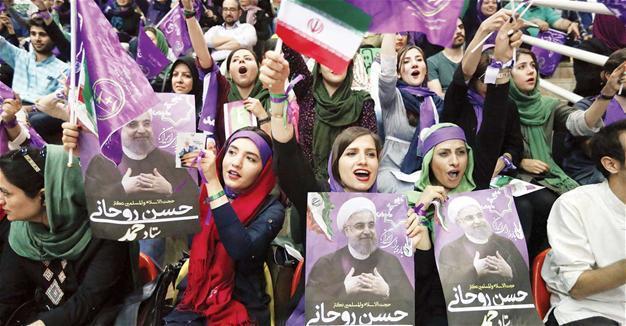Iran votes in head-to-head between diplomacy and resistance
 Iranian voters will decide the fate of moderate President Hassan Rouhani and his policy of engagement with the West on May 19 as he goes head-to-head with hardline cleric Ebrahim Raisi.
Iranian voters will decide the fate of moderate President Hassan Rouhani and his policy of engagement with the West on May 19 as he goes head-to-head with hardline cleric Ebrahim Raisi.Rouhani has spent four years trying to pull Iran out of its global isolation, reaching a 2015 deal with world powers that ended some sanctions in exchange for curbs to its nuclear program.
But with U.S. President Donald Trump threatening to scrap the deal, and visiting Iran’s bitter regional rival Saudi Arabia this weekend, that policy of detente looks increasingly in jeopardy.
Raisi has agreed to stick by the nuclear accord but says Rouhani put too much trust in the West.
“We should not show any weakness in the face of the enemy,” said the 56-year-old Raisi during a televised debate.
On May 17, tens of thousands attended rallies by both candidates on their last day of campaigning in the northeastern city of Mashhad, which is a bastion of support for Raisi.
Rouhani defied religious authorities in the holy city, allowing a concert during his rally.
In the streets of Tehran, young Rouhani supporters wearing his campaign colors of green and purple distributed their last flyers before the polls.
The election essentially became a two-horse race after two other candidates, conservative Tehran mayor Mohammad Bagher Ghalibaf and reformist Eshaq Jahangiri, dropped out this week to boost Raisi and Rouhani respectively.
Rouhani, a 68-year-old cleric, has tried to frame the election as a choice between greater civil liberties and “extremism,” and unofficial polls still put him ahead.
But he has faced a much tougher campaign than anyone expected just a couple of months ago, as hardliners have savaged his economic record, saying his diplomatic efforts have done little to tackle poverty and unemployment.
Raisi was a relative unknown when he joined the race earlier this year, having mostly worked behind the scenes as a top prosecutor and recently as head of the powerful Imam Reza charitable foundation.
A close ally and former pupil of supreme leader Ayatollah Ali Khamenei, he is seen as the preferred choice of the powerful security establishment, advocating a more self-sufficient “resistance economy” rather than a reliance on foreigners.
Raisi has tried to pick up working-class votes by promising more financial support, as well as playing on his status as a “seyed,” or direct descendant of Prophet Mohammed.
Meanwhile, Rouhani says he needs more time to rebuild the economy, which was shattered by years of sanctions and mismanagement when he took over in 2013.
“At the halfway point, we don’t turn back,” he tells voters.
He has vowed to work toward removing the remaining, non-nuclear sanctions imposed by the U.S., which have strangled Iran’s efforts to sign trade deals with European and Asian countries.
Rouhani says he inherited a financial mess from his populist predecessor Mahmoud Ahmadinejad, who was dramatically barred from standing this year by the Guardian Council after falling foul of the conservative establishment. That has left a vacuum for many working-class voters who fondly recall the construction boom, cash hand-outs and earthy rhetoric of Ahmadinejad’s rule.
Voter apathy is a threat to the Islamic regime, which stakes its legitimacy on a high turnout every four years.
Supreme leader Ayatollah Ali Khamenei said a massive turnout was needed to show the continued popularity of the Islamic regime.
“Faced with the enemy, the people should show their determination and calm,” he said on May 17.
Despite the slump, many voters, particularly wealthier urbanites, are attracted to Rouhani’s promise of greater social freedoms.
At his last major rally in Tehran, thousands chanted for reformist leaders locked up after mass protests in 2009.
Rouhani has made thinly veiled references to Raisi’s past as a prosecutor during a period in the 1980s when many dissidents were executed.
“The people of Iran shall once again announce that they don’t approve of those who only called for executions and jail throughout the last 38 years,” he said recently, referring to the 1979 revolution.
“We’ve entered this election to tell those practicing violence and extremism that your era is over.”
Iran condemns new US missile sanctions: spokesman
Iran criticised new U.S. sanctions on its missile program on May 18, saying they would undermine the nuclear deal with world powers.
“Iran condemns the U.S. administration’s ill will in its effort to reduce the positive results of the country’s implementation of JCPOA [nuclear deal] commitments by adding individuals to the list of unilateral and illegal extraterritorial sanctions,” foreign ministry spokesman Bahram Ghasemi said on his Telegram channel.
The administration of U.S. President Donald Trump chose to stick by the nuclear deal with Iran on May 17, renewing a waiver of nuclear-related sanctions despite his past criticism of the agreement.
But it imposed new measures to punish Iranian defence officials and a Chinese business tied to Tehran’s ballistic missile programme, which it says is in breach of international law because they could carry nuclear warheads in the future.
Iran denies ever seeking nuclear weapons and Ghasemi said its missile programme is part of its “absolute and legal right to build up the country’s defensive capabilities.”
















